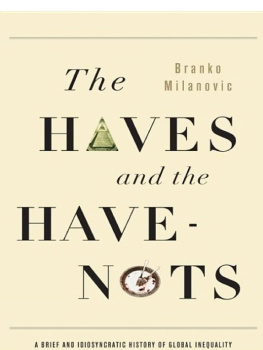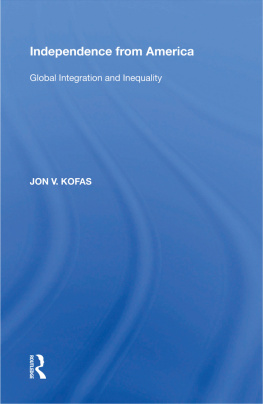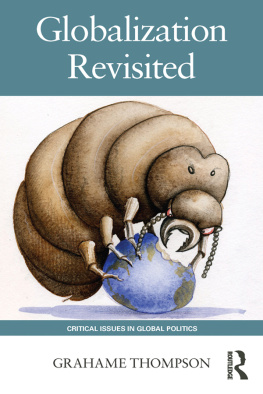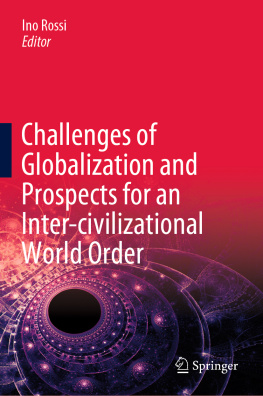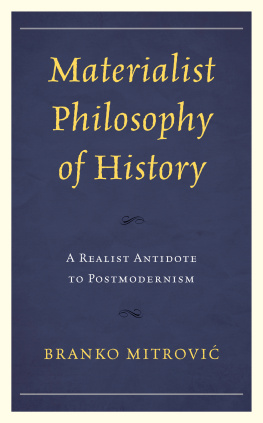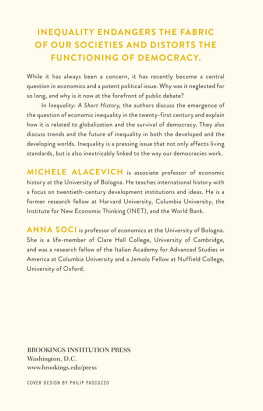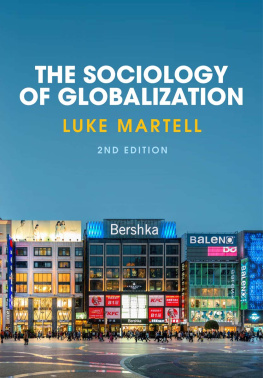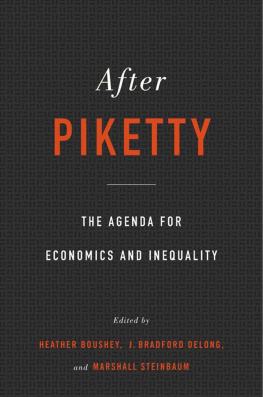Branko Milanovic - Global Inequality: A New Approach for the Age of Globalization
Here you can read online Branko Milanovic - Global Inequality: A New Approach for the Age of Globalization full text of the book (entire story) in english for free. Download pdf and epub, get meaning, cover and reviews about this ebook. year: 0, genre: Politics. Description of the work, (preface) as well as reviews are available. Best literature library LitArk.com created for fans of good reading and offers a wide selection of genres:
Romance novel
Science fiction
Adventure
Detective
Science
History
Home and family
Prose
Art
Politics
Computer
Non-fiction
Religion
Business
Children
Humor
Choose a favorite category and find really read worthwhile books. Enjoy immersion in the world of imagination, feel the emotions of the characters or learn something new for yourself, make an fascinating discovery.

- Book:Global Inequality: A New Approach for the Age of Globalization
- Author:
- Genre:
- Year:0
- Rating:4 / 5
- Favourites:Add to favourites
- Your mark:
- 80
- 1
- 2
- 3
- 4
- 5
Global Inequality: A New Approach for the Age of Globalization: summary, description and annotation
We offer to read an annotation, description, summary or preface (depends on what the author of the book "Global Inequality: A New Approach for the Age of Globalization" wrote himself). If you haven't found the necessary information about the book — write in the comments, we will try to find it.
Global Inequality: A New Approach for the Age of Globalization — read online for free the complete book (whole text) full work
Below is the text of the book, divided by pages. System saving the place of the last page read, allows you to conveniently read the book "Global Inequality: A New Approach for the Age of Globalization" online for free, without having to search again every time where you left off. Put a bookmark, and you can go to the page where you finished reading at any time.
Font size:
Interval:
Bookmark:
GLOBAL INEQUALITY
A New Approach for the Age of Globalization
BRANKO MILANOVIC
THE BELKNAP PRESS OF HARVARD UNIVERSITY PRESS
Cambridge, Massachusetts
London, England
2016
Copyright 2016 by The President and Fellows of Harvard College
All rights reserved
Author photo: R. Krstinic
Jacket design: Jill Breitbarth
978-0-674-73713-6 (alk. paper)
978-0-674-96976-6 (EPUB)
978-0-674-96978-0 (MOBI)
The Library of Congress has cataloged the printed edition as follows:
Names: Milanovi, Branko, author.
Title: Global inequality : a new approach for the age of globalization / Branko Milanovic.
Description: Cambridge, Massachusetts : The Belknap Press of Harvard University Press, 2016. | Includes bibliographical references and index.
Identifiers: LCCN 2015043601
Subjects: LCSH: Equality. | Income distribution. | GlobalizationSocial aspects. | GlobalizationEconomic aspects.
Classification: LCC HM821 .M555 2016 | DDC 305dc23 LC record available at http://lccn.loc.gov/2015043601
This book is the product of years of work on income inequality in general and, more specifically, on global income inequality. Thanking everyone from whom I learned over such a long period is impossible, so I will focus more narrowly on the writing of this book. As everyone knows, the most difficult part is figuring out the structure of a book. Once I decided to begin with the greatest reshuffling of personal incomes in the past two centuries, that is, with the effects of globalization on the distribution of incomes in the world, the rest of the chapters, as in a jigsaw puzzle, quickly fell into place.
The second most difficult problem in writing a book is starting it. The dread of the first sentence. On the advice of my friend Niels Planel, who is himself a writer of nonfiction, I decided to jump-start the book by going for a week to Bocas del Toro in Panama. It was an excellent decision. After a week almost fully dedicated to the book (with a few dips in the Caribbean in between), a good part of the text was done.
It was a pleasure to learn early on from Ian Malcolm of Harvard University Press that the press was interested in publishing the book. There was also, as is often the case in such situations, an element of serendipity: I happened to be in London then, and we agreed on all the details over a coffee (or was it a tea?). Ian made significant contributions as an editor. He went through the text with great care and curiosity, all the while keeping in mind the authors best interests and suggesting revisions with precision and tact. His suggestions improved the book, and some structural modifications that he proposed made it more focused and easier to read.
Louise Robbins did a fabulous job in editing the text. I was very happy that we quickly agreed on a workable approachwhere the voice of the writer would be left unaltered, but mistakes would be corrected and inconsistencies highlighted and ultimately fixed. I am very grateful to Louise for making the book better. It was a real pleasure working with her.
Others at Harvard University Press whose assistance I appreciate include Anne McGuire, who carefully checked the references, and Stephanie Vyce, who was most helpful in doing the review of the sources and quotes I used in the book.
Parts of the chapters that deal with global income distribution have been presented in various talks and conferences, and I am thankful for the feedback I received. For the material in , where I redefine the Kuznets hypothesis and introduce the concept of Kuznets waves, I am grateful for the excellent written comments I received from (in alphabetical order) Guido Alfani, Bob Allen, Christoph Lakner, Peter Lindert, Leandro Prados de la Escosura, and Walter Scheidel, and also for the comments that I received at seminars and conferences where I presented that part of the book: from Steve Broadberry, Ljubomir Madar, and Filip Novokmet in Belgrade; Leandro Prados de la Escosura, Francisco Goerlich, Facundo Alvaredo, Roy van der Weide, and Peter Lanjouw in Valencia; John Bonin at Wesleyan University; Walter Scheidel, Peter Turchin, and Peer Vries in Vienna; and Joe Stiglitz and Suresh Naidu in New York City. Carla Yumatle was very helpful with her comments and discussion of Frantz Fanons work.
I am grateful to friends who generously shared their data with me and answered my many questions: Leandro Prados de la Escosura and Carlos lvarez Nogal, Peter Lindert and Jeffrey Williamson, Giovanni Vecchi and Andrea Brandolini, Jonathan Cribb, Guido Alfani, Walter Ryckbosch, Javier Rodrguez Weber, Christoph Lakner and Tony Atkinson, Luis Brtola, Jan Luiten van Zanden, Wenjie Zhang, Larry Mishel, Michael Clemens, and alar zden. I would especially like to thank Ann Harrison and Peter Nolan, who were first-rate reviewers and whose many suggestions I took very seriously and tried to incorporate into the text. Janet Gornick of the Graduate Center of the City University of New York and Luxembourg Income Study, where I was based during the entire period of the writing and production of this book, was extraordinarily understanding and encouraged me to press on, even during times when I had some doubts.
My wife, Michele de Nevers, and our sons, Nikola and Georgie, were happy to see me write another book. It provided entertainment for me, and gave more free time to them. I am grateful to Michele for gracefully accepting our commuting lifestyle between New York and Washington, DC.
This is a book about global inequality. Throughout the book, I look at both income inequality and political issues related to inequality from a global perspective. Because the world is not united under a single government, however, we cannot dispense with the need to look at individual nation-states. On the contrary, many global issues are played out politically at the level of the nation-state. Thus, greater openness (commercial interchange between individuals from different countries) will have political consequences not at some imaginary worldwide level but within actual countries where the people who are affected by trade live. As a consequence of globalization, for example, Chinese workers might ask for free-trade-union rights from their government, and US workers might ask for protective duties from their government.
Although individual nation-state economies are important, and almost all political action takes place at this level, globalization is an ever stronger force affecting everything from our income levels, our employment prospects, and the extent of our knowledge and information, to the costs of the goods we buy daily and the availability of fresh fruit in the middle of winter. Globalization also introduces new rules of the game through the nascent process of global governance, whether through the World Trade Organization, limits on CO2 emissions, or crackdowns on international tax evasion.
It is therefore time to look at income inequality not as a national phenomenon only, as has been done for the past century, but as a global one. One reason to do so is simply out of curiosity (a trait much appreciated by Adam Smith)our abiding interest in how other people, outside our own country, live. But in addition to mere curiosity, information about the lives and incomes of others may also serve more pragmatic purposes: it may help us in evaluating what to buy or sell and where, in learning ways to do things better and more efficiently, in making decisions about where to migrate. Or we may use the knowledge acquired from how things are done elsewhere in the world to renegotiate our salary with the boss, to complain about too much cigarette smoke, or to ask the waiter for a doggy bag (a custom that has spread from one country to another).
Next pageFont size:
Interval:
Bookmark:
Similar books «Global Inequality: A New Approach for the Age of Globalization»
Look at similar books to Global Inequality: A New Approach for the Age of Globalization. We have selected literature similar in name and meaning in the hope of providing readers with more options to find new, interesting, not yet read works.
Discussion, reviews of the book Global Inequality: A New Approach for the Age of Globalization and just readers' own opinions. Leave your comments, write what you think about the work, its meaning or the main characters. Specify what exactly you liked and what you didn't like, and why you think so.

